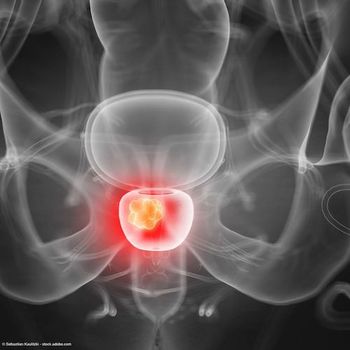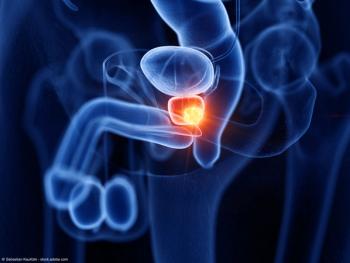
18F-fluciclovine PET/CT accurately detects metastases in high-risk prostate cancer
The imaging modality detected nodal metastasis with a sensitivity of 55.3% and a specificity of 84.8% in each patient.
Fluorine (18F) fluciclovine positron emission tomography/computerized tomography (PET/CT) detects metastases better than conventional imaging in high-risk prostate cancer, according to a study published in the Journal of Urology.1 Use of 18F-fluciclovine PET/CT may more accurately stage prostate cancer, helping clinicians better plan surgery and other cancer treatment, according to Emory University investigators.
In this clinical trial, 57 patients with high-risk prostate cancer were staged by conventional imaging, including 99mTc-methylene diphosphonate bone scanning and CT or magnetic resonance imaging (MRI). They then underwent 18F-fluciclovine (Axumin) PET/CT, followed by robotic radical prostatectomy and extended pelvic lymph node dissection.
“The results of the PET/CT were then compared with histologic findings at surgery. All the surgery was performed with great expertise by urologist Mehrdad Alemozaffar[,MD], who is first author on the paper,” said study author David M. Schuster, MD, FACR, professor and director of the Division of Nuclear Medicine and Molecular Imaging, Department of Radiology and Imaging Sciences, at Emory University in Atlanta, Georgia. The study was sponsored by the National Institutes of Health as part of the Emory, Harvard, and University of Washington Prostate Cancer Biomarker Center.
18F-fluciclovine PET/CT detected nodal metastasis with a sensitivity of 55.3% and a specificity of 84.8% in each patient. PET imaging sensitivity and specificity were 54.8% and 96.4%, respectively, per region (right and left pelvis, presacral and nonregional), according to the paper.
The advanced imaging had 22% greater sensitivity for each patient compared with conventional imaging. And 18F-fluciclovine PET/CT detected regional and nonregional metastases in patients with prostate cancer that went undetected with conventional imaging. PET/CT detected metastases in 7 more patients and 22 more regions and identified distant disease or other cancers in 4 patients.
These findings are in line with results of other studies published in the literature, according to the paper.
“Molecular imaging with advanced radiotracers such as fluciclovine…PET can help better stage patients before surgery. A negative PET would not take the place of doing a lymph node dissection because it will not detect microscopic cancer. But because of the high specificity of PET, the study could help surgeons guide their surgery and predict which patients may benefit or not benefit from surgery,” Schuster said.
The findings suggest that advanced molecular imaging with PET radiotracers should be utilized before surgery, if available, for patients with a higher risk of metastasis because the sensitivity is superior to that of CT or MRI in detecting the spread, according to Schuster. “We had a good idea that this type of PET scan would provide improved sensitivity compared with conventional CT or MR, but the degree of improvement was impressive,” he said.
18F-fluciclovine PET/CT is FDA approved for use in recurrent prostate cancer. “It would be good if such imaging could be FDA approved in the future for a primary staging indication and included in the National Comprehensive Cancer Network guidelines,” Schuster concluded.
Disclosures: Schuster is a consultant for Syncona, AIM Specialty Health, Global Medical Solutions Taiwan, and Progenics Pharmaceuticals, Inc. He participates through the Emory Office of Sponsored Projects in grants, including those funded or partially funded by Blue Earth Diagnostics, Ltd; Nihon Medi-Physics Co, Ltd; Telix Pharmaceuticals (US) Inc; Advanced Accelerator Applications; FUJIFILM Pharmaceuticals U.S.A., Inc; and Amgen Inc.
Reference
Alemozaffar M, Akintayo AA, Abiodun-Ojo OA, et al. [18F]Fluciclovine positron emission tomography/computerized tomography for preoperative staging in patients with intermediate to high risk primary prostate cancer. J Urol. 2020;204(4):734-740. doi:10.1097/JU.0000000000001095
Newsletter
Stay current with the latest urology news and practice-changing insights — sign up now for the essential updates every urologist needs.






